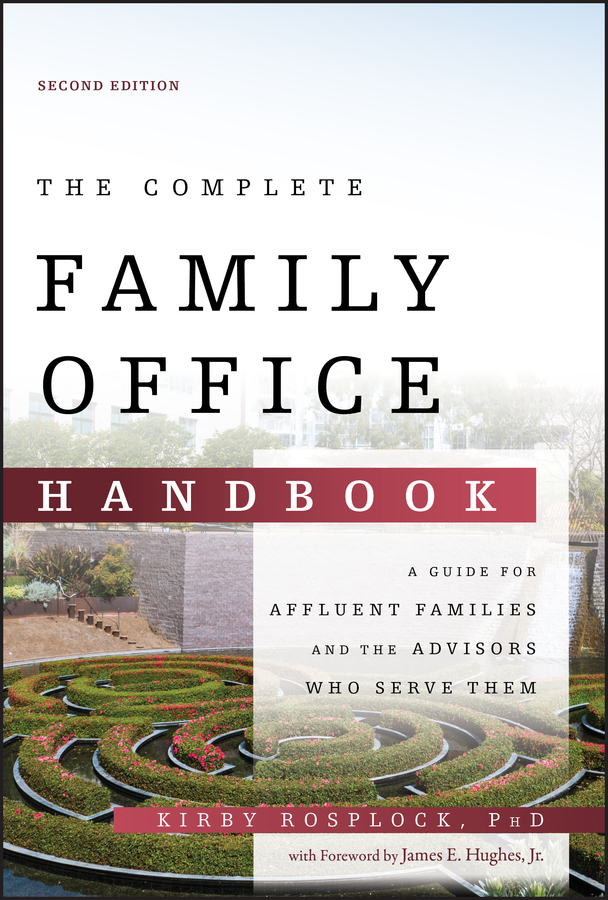Family offices transfer wealth, rebalance portfolios and embrace technology during Covid-19 pandemic

More families recognise the need to invest in the family capital as a means to sustain the financial capital of the family, Dr Kirby Rosplock says.
The family member turned recognised researcher, innovator, adviser, author and speaker in the family business and family office space tells CampdenFB about the shifts she is seeing take place in wealth management, investment strategy and technological sophistication within family offices in the wake of the Covid-19 pandemic.
Rosplock grew up in an enterprising multigenerational family as a shareholder and board member of Babcock Lumber Co, her family’s business in Pittsburgh, Pennsylvania.
She is the founder, innovator and driver of Tamarind Partners, a family office consultancy based in Florida.
The author of The Complete Family Office Handbook said wealth education for families has evolved during the pandemic. Resources like the handbook are helpful and more tools and education are coming to the surface.
Rosplock shares her insights when asked how families can encourage a principal to make way for a successor, engage the next generation, create robust governance and hire the best professionals for the family office.
 What trends are you seeing in the family office space?
What trends are you seeing in the family office space?
There are several emerging trends within the family office space as we surface from the pandemic. Despite the pandemic, the incredible stimulus boosted the stock market in 2020 with unprecedented gains despite significant global volatility. The growth of high-net worth individuals in North America even outpaced Asia-Pacific, the first time in the last five years, according to Wealth-X in 2020.
First, other emergent trends include family offices are becoming leaner and more efficient organisations as the reliance on technology solutions for reporting, data aggregation, data and investment analysis, document storage, accounting and general ledger has increased. Couple this with the new normal or working remotely and autonomously, family offices had to manage new threats and challenges such as cybersecurity, creating secure remote workers, managing teams at a distance, revamping some of their governance, and communications.
One study found that 20% of family offices have knowingly experienced a cyber security breach, with the most common attacks coming in the form of phishing (76%), malware (33%) and social engineering (33%), the Campden Wealth Global Family Office Report 2019 said.
Second, family offices are reconsidering their investment mandates. More than half (55%) of family offices rebalanced their portfolios as a function of the pandemic in March through May 2020, to maintain their long-term strategic asset allocation, according to the UBS Global Family Office Report 2020. Most (69%) viewed private equity as a key driver of returns many family offices are also shining a bigger spotlight in sustainable investing, ESG and/or impact investing as 62% of family offices deem this important according to the UBS report.

Third, we are witnessing an unprecedented shift of wealth as the Silent Generation, people born from 1928 to 1945, and Boomers, born between 1946 and 1964, retire and move wealth to future heirs. The millennials now make up the largest component of the workforce. Succession and governance are two focal points for most developing family offices as they manage the transition of ownership and wealth from one generation to the next.
According to Wealth-X in 2020, well over half of the ultra-high net worth population are ages 50 to 70, whereas just 12% are younger than 50 (and only 1.2% are under 35). Certainly many have been focused on the proposed tax revisions that the Biden administration is championing. This is keeping estate planning and tax advisers very busy as family offices look to leverage gifting opportunities, mitigate unnecessary tax consequences and plan for efficient and effect wealth transfer in light of the proposed tax changes in the US.
 Are you seeing an increasing appetite for risk in investments/co-investments among family offices or not and, if so, in which asset classes?
Are you seeing an increasing appetite for risk in investments/co-investments among family offices or not and, if so, in which asset classes?
Yes, and also, no. There are more investors seeking private equity and direct investing exposure; in fact, one study found that 77% of family offices surveyed are invested in private equity (UBS Global Family Office Report, 2020). That said, I personally don’t believe all of them are interested necessarily to take on more risk. They are investing in what they know or have experience and prior exposure.
The sectors family offices like to deploy private equity into include information technology, healthcare, real estate. Many of these family office investors are aligning strategic insight, connections, or proprietary knowledge on specific asset classes or investment opportunities giving them the advantage. The dislocations created by the pandemic—think travel, supply chain, distribution, entertainment, health, pharmaceuticals among others—have generated a desire to lean into innovation and opportunity where it presents itself.
_G.jpg) Has the Covid-19 crisis exposed or accelerated positive and or negative issues within the family office space?
Has the Covid-19 crisis exposed or accelerated positive and or negative issues within the family office space?
Call me an optimist, but I see more positive change than negative. Although the super-wealthy are often demonised, one or two bad eggs does not reflect the majority. In fact, family offices have often been at the tip of the spear to champion change and get behind resolving the grim reality of the pandemic. Look back to 2020 and consider some 200 plus billionaires donated a total of $7.2 billion during March to June 2020. Certain family offices, such as Athos Service GmbH, put their money where their mouth is, providing significant funding for vaccine development such as BioNTech.
I believe the crisis has become an important wake up call to marshal resources and step up to create the positive changes needed. This also goes for updating protocols and practices within the family office, spending more time and investment to upgrade antiquated systems and review all forms of risk.
 Will President Biden’s administration help or hinder family offices?
Will President Biden’s administration help or hinder family offices?
I don’t have a crystal ball, but I could answer yes, it will hinder many family offices and yes, it could help other family offices as well. Keep in mind that the 10 wealthiest saw their net worth grow by an average of 25%, while family dynasties grew at a rate 10 times greater than that of the typical family, according to a new report from the Institute for Policy Studies (IPS). As such, many wealth family offices sit on one or the other side of the table when it comes to the proposed tax increases. Those opposed are pouring money into PACS and lobbying agencies to fight tax policy change and keep the status quo. Yet, when we compare the amount of taxes the wealthiest Americans pay today versus their counterparts in 1953—it is just one-sixth.
If we consider how wide the gap between the “Haves” and the “Have Nots” has become, we might also say that Biden’s planning will help create jobs, infrastructure improvements and galvanise a largely disenfranchised part of the US population to get back to work, paying taxes and being counted as contributors to the US and global economies.
Which aspects of a family office do families need to improve upon?
Assessing where a family office may have weakness should be part of its annual strategic planning review and audit. Strategic planning, emphasised in Chapter 6 of The Complete Family Office Handbook (Wiley, 2021), outlines some of the best practices to create and maintain a strategic plan for the family office looking across multiple disciplines from estate planning and tax, to risk management, investing, capital sufficiency, to means of stress testing the family office.
The family office is an iterative and evolving structure. Some could say it is always a “work-in-progress.” If you read the Mathile case study in chapter 2, they provide an inside look to their approach to strategic planning. If you want to hear Jill Barber, head of the Mathile office share more, click here to listen to a recent podcast with her.
 How can family members encourage an ageing founder to transfer control of a family entity?
How can family members encourage an ageing founder to transfer control of a family entity?
Strong leadership at the help of successful family enterprises, offices and wealth often is vested and deeply connected to what they have created. It is never an easy conversation, but consider embracing a transparency exercise such as conducting an audit of the family office and its owners or education on what family members know, do not know or want to know more about as it relates to the family wealth. The audit is a practical and helpful exercise to commence every 2-3 years or when a major stressor occurs, such as the pandemic or global downturn in the economy. Family members often need to take stock, reassess and come at issues of aging and succession from the perspective of continuity and sustainability of the family office.

What is the secret to engaging the next generation into the family business or office?
Education, communication and onramps are key ingredients to successfully engaging the next generation of the family with respects to the business or office. From the technical basics of how it operates, how they may (or may not) be involved, expectations if they should want to get involved and the understanding of its functions and services is critical. Further, creating opportunities to join junior boards or other steppingstones towards leadership opportunities is key.
Having actual opportunities to get the rising generation involved helps them to be vested and more directly interested in how the family office operates. Chelsea Toler recently sat down with me and shared some of her experiences with her family’s foundation and how to get the rising generation involved if readers want to click here to listen to her podcast. She also shares more of her experiences in Chapter 12, Family Education and the Family Office, of The Complete Family Office Handbook.
What elements are essential to include when writing a family constitution?
When it comes to constitutions the best ones are those conceived and created by owners with the help of consultants or experts. These quasi-legal documents may evolve and grow over time to include various policies and procedures, and there are clear ways to amend the constitution if needed. The Kettering family provided an inside look to the governance in their family office and how it evolved over many decades. No doubt, governance of a family office is a cornerstone to high functioning ones and is discussed in greater detail in Chapter 11 of The Complete Family Office Handbook.
How can families attract and retain the best non-family C-suite professionals in their family offices?
Retention is a function of good alignment, employee appreciation and incentives. Family owners need to also put into place performance metrics that align with those compensation structures. Retention is also a function of job satisfaction and opportunities to advance and progress. Consider how the family office is evolving and opportunities for advancement for professionals. Compensate competitively or you may find your talent jumping ship after one or two years. More on family office talent, recruitment, and compensation, can be found in Chapter 10 of The Complete Family Office Handbook.







